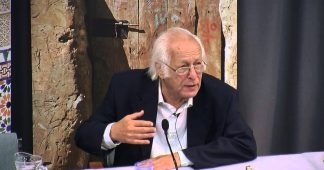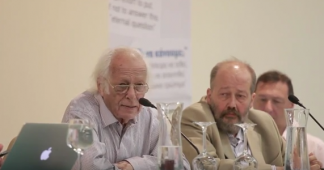1
For the last thirty years the world system has undergone an extreme centralization of power in all its dimensions, local and international, economic and military, social and cultural.
Some thousand giant corporations and some hundreds of financial institutions that have formed cartels among themselves, have reduced national and globalized production systems to the status of sub-contractors. In this way the financial oligarchies appropriate a growing share of the profits from labour and from companies that have been transformed into rent producers for their exclusive benefit.
Having domesticated the main right-wing and left-wing parties the unions and the organizations of the so-called civil society, these oligarchies now also exercise absolute political power as well as the media that is subordinated to them, creating the necessary disinformation to depoliticize public opinion. The oligarchies have annihilated the traditional practice of multi-partyism, replacing it to almost to a one-party system, controlled by capital. Representative democracy having lost all its meaning, has lost its legitimacy.
This late contemporary capitalism, which is a completely closed system, corresponds to the criteria of ‘totalitarianism’, although care is taken not to name it as such. The totalitarianism is still ‘soft’ but it is always ready to resort to extreme violence as soon as the victims – the majority of workers and peoples – begin to revolt. All changes that are part of this so-called ‘modernization’ must be seen in light of the foregoing analysis. This is thus the case of major ecological challenges (especially climate change) that capitalism is incapable of resolving (the Paris agreement of December 2016 was only a smokescreen), as well as scientific progress and technological innovations (including IT), which are rigorously subjected to the requirements of the financial profit that they can make for the monopolies. The glorification of competitiveness and the freedom of the market that the subservient media present as guarantees of the freedom and efficiency of civil society are indeed the antithesis of the reality, which is riven by violent conflicts between fractions of the existing oligarchies and is the cause for the destructive effects of their governance.
2
At the world level, contemporary capitalism always follows the same imperialist logic that was typical as it became globalized from the start (the colonization of the 19th century was clearly a form of globalization). Contemporary ‘globalization’ does not escape this logic: it is nothing else but a new form of imperialist globalization. This term ‘globalization’, so often used without any definition, hides an important fact: the deployment of systematic strategies that have been developed by the historical imperialist powers (United States, Western and Central European countries, Japan, which I shall call ‘the Triad’) that continue to pillage the resources of the Global South and the super-exploitation of its labour that is associated with delocalization and subcontracting. These powers intend to maintain their ‘historical privilege’ and to prevent all the other nations from extricating themselves from the status of dominated peripheries. The history of the last century was in fact that of the revolt of the peoples of the peripheries of the world system who were engaged in a socialist de-linking or in attenuated forms of national liberation, whose page has, for the moment, been turned. The re-colonization now under way, which has no legitimacy, is therefore fragile.
For this reason the historical imperialist powers of the Triad have set up a system of collective military control over the planet, directed by the United States. Membership of NATO, which is inextricably linked to the construction of Europe, as also the militarization of Japan, reflects the requirement of this new collective imperialism which has taken over the national imperialisms (of the United States, Great Britain, Japan, Germany, France and a few others) which were formerly in permanent and violent conflict.
In these conditions, constructing an international front of workers and the peoples of the whole world has to be the main objective of the struggle to meet the challenge of counteracting the spreading of contemporary imperialist capitalism.
3
Confronted by this tremendous challenge, the inadequacy of the struggles being carried out by the victims of the system is all too apparent. Their weaknesses are of different kinds which I would classify under the following headings:
- i) the extreme fragmentation of the struggles, whether at the local or world level, which are always specific and conducted in particular places and subject-matters (ecology, women’s rights, social services, community demands, etc.) The rare campaigns conducted at the national or even world level have not had any significant success in that they have not forced any changes of the policies being carried out by those in power. Many of these struggles have been absorbed by the system and foster the illusion that it is possible to reform it.
Nevertheless, there has been an enormous acceleration in the process of generalized proletarianization. Almost all the populations in the central capitalist countries are now subjected to the status of waged workers selling their labour. The industrialization of regions in the Global South has created worker proletariats and salaried middle classes while their peasantries are now fully integrated into the market system. But the political strategies employed by the powerful have succeeded in fragmenting this gigantic proletariat into diverse fractions that are often in conflict with each other. This contradiction must be overcome.
- ii) The peoples of the Triad (USA, Western and Central Europe, Japan) have renounced international anti-imperialist solidarity, which has been replaced at best by ‘humanitarian’ campaigns and ‘aid’ programmes that are controlled by the capital of the monopolies. The European political forces that inherited left-wing traditions thus now support the imperialist vision of existing globalization.
iii) A new right-wing ideology has gained support among the people.
In the North, the central theme of anti-capitalist class struggle has been abandoned, or reduced to a greatly incomplete expression – for the benefit of a so-called new definition of the left-wing ‘partner culture’ or communitarianism, separating the defence of specific rights from the general fight against capitalism.
In certain countries of the South, the tradition of struggles that associated the anti-imperialist struggle with social progress has given way to reactionary backward-looking illusions expressed by religions or pseudo ethics. In other countries of the South, the successful acceleration of economic growth over the last decades feeds the illusion that it is possible to construct a ‘developed’ national capitalism capable of imposing its active participation in shaping globalization.
4
The power of the oligarchies of contemporary imperialism seems to be indestructible, in the countries of the Triad and even at the world level (“the end of history”!). Public opinion subscribes to its disguise as ‘market democracy’, preferring it to its past adversary – socialism – which is invariably embellished by such odious sobriquets as criminal, nationalist or totalitarian autocracies.
However this system is not viable for many reasons:
i)Contemporary capitalism is presented as being ‘open’ to criticism and reform, as innovative and flexible. Some voices claim to put an end to the abuses of its uncontrolled finance and the permanent austerity policies that accompany it – and thus ‘save capitalism’. But such calls will remain in vain as present practices serve the interests of the oligarchs of the Triad – the only ones that count – as they guarantee the continual increase of wealth in spite of the economic stagnation that besets their countries.
ii)The European sub-system is an integral part of imperial globalization. It was conceived in a reactionary spirit, that was anti-socialist and pro-imperialist, subordinate to the military command of the United States. Within it, Germany exercises its hegemony, particularly in the framework of the euro zone and over Eastern Europe which has been annexed just as Latin America has been annexed by the United States. ‘German Europe’ serves the nationalist interests of the German oligarchy, which are expressed with arrogance, as we saw in the Greek crisis. This Europe is not viable and its implosion has already started.
iii)The stagnation of growth in the countries of the Triad contrasts with the acceleration in growth of regions in the South which have been able to profit from globalization. It has been concluded too hastily that capitalism is alive and well, even if its centre of gravity is moving from the old countries of Atlantic West to the South, particularly Asia. In actual fact the obstacles to pursuing this historical corrective movement are likely to become increasingly violent, including military aggression. The imperial powers do not intend to allow any country of the periphery – great or small – to free themselves from domination.
iv)The ecological devastation that is necessarily associated with capitalist expansion is reinforcing the reasons why this system is not viable.
We are now in the phase of the ‘autumn of capitalism’ without this being strengthened by the emergence of ‘the people’s spring’ and a socialist perspective. The possibility of substantial progressive reforms of capitalism in its current stage is only an illusion. There is no alternative other than that enabled by a renewal of the international radical left, capable of carrying out – and not just imagining – socialist advances. It is necessary to end crisis-ridden capitalism rather than try to end the crisis of capitalism.
Based on a first hypothesis, nothing decisive will affect the attachment of the peoples of the Triad to their imperialist option, especially in Europe. The victims of the system will remain incapable of conceiving their way out of the paths that have been traced by the ‘European project’ which has to be deconstructed before it can then be reconstructed with another vision. The experiences of Syriza, Podemos and France Insoumise , the hesitations of Die Linke and others testify to the extent and complexity of the challenge. The facile accusation of ‘nationalism’ of those critical of Europe does not hold water. The European project is increasingly visible as being that of the bourgeois nationalism of Germany. There is no alternative in Europe, as elsewhere, to the setting up of national, popular and democratic projects (not bourgeois, indeed anti-bourgeois) that will begin the delinking from imperialist globalization. It is necessary to deconstruct the extreme centralization of wealth and the power that is associated with the system.
According to this hypothesis, the most probable outcome will be a remake of the 20th century: advances made exclusively in some of the peripheries of the system. But these advances will remain fragile, as have those of the past, and for the same reason – the permanent warfare waged against them by the imperialist power centres, the success of which is greatly due to their own limits and deviations.
Whereas the hypothesis of a worker and people’s internationalism opens up the way to further evolutions that are necessary and possible.
The first of these ways is that of the ‘decadence of civilization’. In that case, these evolutions are not to be masterminded by anyone, their trail must be blazed only by the needs created by the situation. However, in our epoch, given the power of ecological and military destruction and the disposition of the powerful to use it, the risk, denounced by Marx in his time, that there is a very real risk that the fighting will destroy all the camps that oppose each other. The second path, by contrast, will require the lucid and organized intervention of the international front of the workers and the peoples.
5
Creating a new Internationale of workers and peoples must be the main objective for the genuine militants who are convinced of the odious nature of the world imperialist capitalist system that we have at present. It is a heavy responsibility and the task requires several years before giving any tangible results. As for myself, I put forward the following proposals:
i)The aim should be to establish an Organization (the new Internationale) and not just a ‘movement’. This involves moving beyond the concept of a discussion forum. It also involves analysing the inadequacies of the notion, still prevalent, that the ‘movements’ claim to be horizontal and are hostile to so-called vertical organizations on the pretext that the latter are by their very nature anti-democratic: that the organization is, in fact, the result of action which by itself generates ‘leaders’. The latter can aspire to dominate, even manipulate the movements. But it is also possible to avoid this danger through appropriate statutes. This should be discussed.
ii)The experience of the worker Internationales should be seriously studied, even if they belong to the past. This should be done, not in order to ‘choose’ a model among them, but to invent the most suitable form for contemporary conditions.
iii) Such an invitation should be addressed to a good number of combative parties and organizations. A committee should first be set up to get the project started.
- iv) I don’t want to make this text any heavier. However, I attach some complementary texts
(in English and in French):
- a fundamental text on the unity and diversity of movements towards socialism in modern history;
- a text on the implosion of the European project;
- some texts on: the audacity required for renewing the radical left; reading Marx; the new agrarian question; the lesson of October 1917 and of Maoism; the necessary renewal of national, popular projects.











